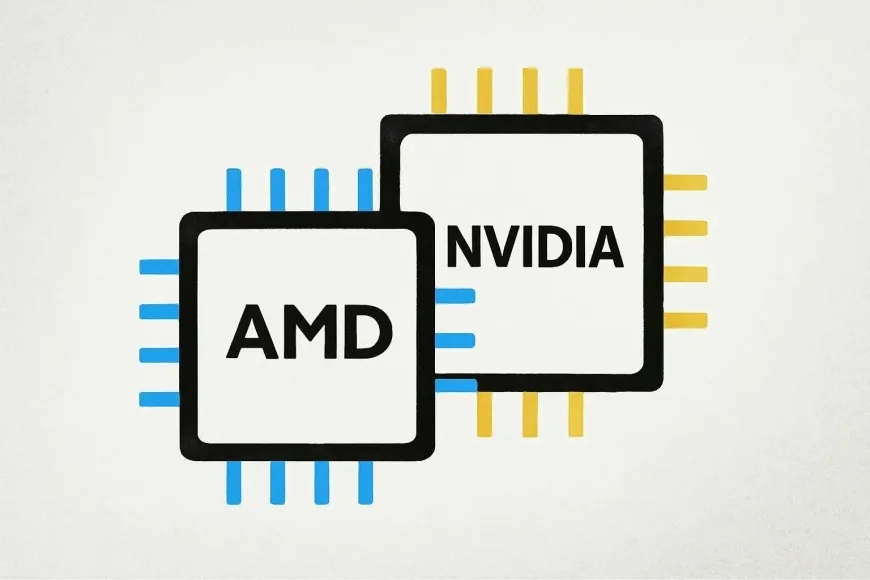U.S. Government to Collect 15% of Nvidia and AMD's China AI Chip Revenue
U.S. Government will collect 15% of revenue from Nvidia and AMD's AI chip sales in China under new export license requirements.

Nvidia and AMD will be required to pay the U.S. government 15% of revenue from their artificial intelligence (AI) chip sales in China, under a newly imposed export license agreement confirmed by a White House official. The condition applies to high-performance processors such as Nvidia’s H20 and AMD’s MI308 — chips designed for advanced AI workloads — and marks a rare instance of revenue sharing in U.S. export policy. The agreement grants both companies renewed permission to sell select AI semiconductors to Chinese buyers while maintaining federal oversight on sensitive technology transfers.
A Break From Traditional Export Licensing
In the past, export licenses for sensitive technology primarily involved compliance with security protocols and destination restrictions. They rarely, if ever, required companies to share ongoing profits with the U.S. government.
By linking market access in China to a continuing revenue stream, the Biden administration (through policies retained under the Trump administration) is setting a precedent that blends national security oversight with financial leverage.
Industry experts suggest this approach allows American firms to retain a foothold in China’s growing AI sector while ensuring the U.S. benefits economically from technology exports that could carry strategic risks.
The Chips Covered by the Agreement
The revenue-sharing deal applies to Nvidia’s H20 and AMD’s MI308 — two of the most advanced AI chips currently on the market.
-
Nvidia H20 – Designed for AI workloads such as large-scale language model training, data center applications, and advanced analytics, the H20 was tailored to comply with earlier U.S. export controls for China. However, tightened rules earlier this year temporarily blocked its shipment.
-
AMD MI308 – A competitive AI accelerator aimed at enterprise and research-level AI tasks, also restricted under the same updated export regulations.
In July, Nvidia CEO Jensen Huang confirmed that the Trump administration had granted approval to restart shipments of the H20 to China — but only under the condition that 15% of the revenue from those sales goes directly to the U.S. government.
National Security at the Core
The U.S. Commerce Department classifies these AI chips as “dual-use” technology — meaning they can be deployed for both civilian applications and military purposes. Officials have warned that unrestricted access could accelerate China’s development of next-generation weapons systems, advanced cyber operations, and state-level AI capabilities.
By imposing revenue-linked export conditions, Washington aims to:
-
Slow China’s access to cutting-edge AI hardware.
-
Preserve U.S. dominance in semiconductor innovation.
-
Maintain a controlled presence in the Chinese tech market.
U.S. Export Deal Pressures Nvidia, AMD
Nvidia has reiterated that it complies fully with U.S. trade rules and expressed hope that export controls will still allow American companies to compete globally. The company noted it has not shipped the H20 to China for months, suggesting pent-up demand that could boost sales once exports resume under the new rules.
AMD has not issued an official statement regarding the revenue-sharing requirement.
While the exact financial impact of the deal is unclear, industry analysts expect the arrangement to generate substantial revenue for the U.S. government, given China’s role as one of the largest buyers of AI hardware.
Where Will the Revenue Go?
The White House has not disclosed how the 15% revenue will be used. Potential uses could include:
-
Funding U.S. semiconductor research and development.
-
Expanding domestic chip manufacturing under initiatives like the CHIPS and Science Act.
-
Supporting defense-related technology programs.
A Blueprint for Future Technology Exports
Trade policy experts believe the Nvidia–AMD agreement could serve as a test case for regulating other high-value technologies with security implications, such as quantum computing, advanced robotics, and biotechnology.
If successful, revenue-sharing export licenses could become a powerful new tool for the U.S. in balancing economic opportunity with strategic control over sensitive technology.
The deal makes clear that AI chips are now treated as instruments of national power, not just commercial products. Future U.S.–China semiconductor trade will be governed as much by export controls and security strategy as by sales potential.
Also Read: AWS to Give U.S. Agencies $1B in Cloud Discounts by 2028































































